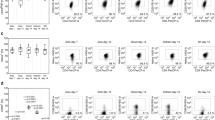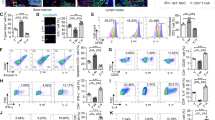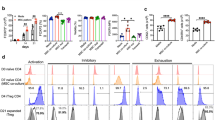Abstract
Mesenchymal stem cells (MSC) have recently been used successfully in humans to control severe graft-versus-host disease. However, the mechanisms involved in their immunomodulatory effects remain a matter of debate. Here, we show that MSC are unable to activate allogeneic T cells even in the presence of T-cell growth factors. We then found that MSC inhibit T-cell proliferation triggered either by allogeneic, mitogenic or antigen-specific stimuli. Interestingly, MSC inhibit T-cell proliferation by inducing apoptosis of activated T cells, but have no effect on resting T cells. Furthermore, we show that this apoptosis could be related to the conversion of tryptophan into kynurenine by indoleamine 2,3-dioxygenase expressed by MSC in the presence of IFNγ. Moreover, we show that the inhibitory effect of MSC is neither abrogated nor modified during expansion in culture or after irradiation. Together, these results bring new insight to the mechanisms of immunosuppression induced by MSC and might help to develop their clinical use controlling immune-related adverse effects in humans.
This is a preview of subscription content, access via your institution
Access options
Subscribe to this journal
Receive 12 print issues and online access
$259.00 per year
only $21.58 per issue
Buy this article
- Purchase on Springer Link
- Instant access to full article PDF
Prices may be subject to local taxes which are calculated during checkout







Similar content being viewed by others
References
Pittenger MF, Mackay AM, Beck SC, Jaiswal RK, Douglas R, Mosca JD et al. Multilineage potential of adult human mesenchymal stem cells. Science 1999; 284: 143–147.
Prockop DJ . Marrow stromal cells as stem cells for nonhematopoietic tissues. Science 1997; 276: 71–74.
Campagnoli C, Roberts IA, Kumar S, Bennett PR, Bellantuono I, Fisk NM . Identification of mesenchymal stem/progenitor cells in human first-trimester fetal blood, liver, and bone marrow. Blood 2001; 98: 2396–2402.
Koc ON, Gerson SL, Cooper BW, Dyhouse SM, Haynesworth SE, Caplan AI et al. Rapid hematopoietic recovery after coinfusion of autologous-blood stem cells and culture-expanded marrow mesenchymal stem cells in advanced breast cancer patients receiving high-dose chemotherapy. J Clin Oncol 2000; 18: 307–316.
Horwitz EM, Gordon PL, Koo WK, Marx JC, Neel MD, McNall RY et al. Isolated allogeneic bone marrow-derived mesenchymal cells engraft and stimulate growth in children with osteogenesis imperfecta: Implications for cell therapy of bone. Proc Natl Acad Sci USA 2002; 99: 8932–8937.
Chamberlain JR, Schwarze U, Wang PR, Hirata RK, Hankenson KD, Pace JM et al. Gene targeting in stem cells from individuals with osteogenesis imperfecta. Science 2004; 303: 1198–1201.
Le Blanc K, Rasmusson I, Sundberg B, Gotherstrom C, Hassan M, Uzunel M et al. Treatment of severe acute graft-versus-host disease with third party haploidentical mesenchymal stem cells. Lancet 2004; 363: 1439–1441.
Bartholomew A, Sturgeon C, Siatskas M, Ferrer K, McIntosh K, Patil S et al. Mesenchymal stem cells suppress lymphocyte proliferation in vitro and prolong skin graft survival in vivo. Exp Hematol 2002; 30: 42–48.
Di Nicola M, Carlo-Stella C, Magni M, Milanesi M, Longoni PD, Matteucci P et al. Human bone marrow stromal cells suppress T-lymphocyte proliferation induced by cellular or nonspecific mitogenic stimuli. Blood 2002; 99: 3838–3843.
Krampera M, Glennie S, Dyson J, Scott D, Laylor R, Simpson E et al. Bone marrow mesenchymal stem cells inhibit the response of naive and memory antigen-specific T cells to their cognate peptide. Blood 2003; 101: 3722–3729.
Djouad F, Plence P, Bony C, Tropel P, Apparailly F, Sany J et al. Immunosuppressive effect of mesenchymal stem cells favors tumor growth in allogeneic animals. Blood 2003; 102: 3837–3844.
Le Blanc K, Tammik C, Rosendahl K, Zetterberg E, Ringden O . HLA expression and immunologic properties of differentiated and undifferentiated mesenchymal stem cells. Exp Hematol 2003; 31: 890–896.
Tse WT, Pendleton JD, Beyer WM, Egalka MC, Guinan EC . Suppression of allogeneic T-cell proliferation by human marrow stromal cells: implications in transplantation. Transplantation 2003; 75: 389–397.
Moriscot C, de Fraipont F, Richard MJ, Marchand M, Savatier P, Bosco D et al. Human bone marrow mesenchymal stem cells can express insulin and key transcription factors of the endocrine pancreas developmental pathway upon genetic and/or microenvironmental manipulation in vitro. Stem cell 2005; 23: 594–603.
Manches O, Lui G, Chaperot L, Gressin R, Molens J, Jacob M et al. In vitro mechanisms of action of rituximab on primary non-Hodgkin's lymphomas. Blood 2003; 101: 949–954.
Lajmanovich A, Irisarri M, Molens JP, Pasquier MA, Sotto JJ, Bensa JC et al. Impairment of death-inducing signalling complex formation in CD95-resistant human primary lymphoma B cells. Br J Haematol 2004; 124: 746–753.
Guillaudeux T, Rodriguez AM, Girr M, Mallet V, Ellis SA, Sargent IL et al. Methylation status and transcriptional expression of the MHC class I loci in human trophoblast cells from term placenta. J Immunol 1995; 154: 3283–3299.
Fallarino F, Grohmann U, Vacca C, Bianchi R, Orabona C, Spreca A et al. T cell apoptosis by tryptophan catabolism. Cell Death Differ 2002; 9: 1069–1077.
Meisel R, Zibert A, Laryea M, Gobel U, Daubener W, Dilloo D . Human bone marrow stromal cells inhibit allogeneic T-cell responses by indoleamine 2,3-dioxygenase-mediated tryptophan degradation. Blood 2004; 103: 4619–4621.
Munn DH, Zhou M, Attwood JT, Bondarev I, Conway SJ, Marshall B et al. Prevention of allogeneic fetal rejection by tryptophan catabolism. Science 1998; 281: 1191–1193.
Acknowledgements
We thank Karin TARTE for tryptophan and kynurenine determinations. We thank the staff of Immunogical Laboratory and Molecular Biology Laboratory of EFS Grenoble for technical assistance. This work was supported by Etablissement Français du Sang.
Author information
Authors and Affiliations
Corresponding author
Rights and permissions
About this article
Cite this article
Plumas, J., Chaperot, L., Richard, MJ. et al. Mesenchymal stem cells induce apoptosis of activated T cells. Leukemia 19, 1597–1604 (2005). https://doi.org/10.1038/sj.leu.2403871
Received:
Accepted:
Published:
Issue Date:
DOI: https://doi.org/10.1038/sj.leu.2403871
Keywords
This article is cited by
-
sFgl2 gene-modified MSCs regulate the differentiation of CD4+ T cells in the treatment of autoimmune hepatitis
Stem Cell Research & Therapy (2023)
-
Therapeutic approaches targeting CD95L/CD95 signaling in cancer and autoimmune diseases
Cell Death & Disease (2022)
-
Stem Cells and the Microenvironment: Reciprocity with Asymmetry in Regenerative Medicine
Acta Biotheoretica (2022)
-
Latest advances to enhance the therapeutic potential of mesenchymal stromal cells for the treatment of immune-mediated diseases
Drug Delivery and Translational Research (2021)
-
Taming of Covid-19: potential and emerging application of mesenchymal stem cells
Cytotechnology (2021)



